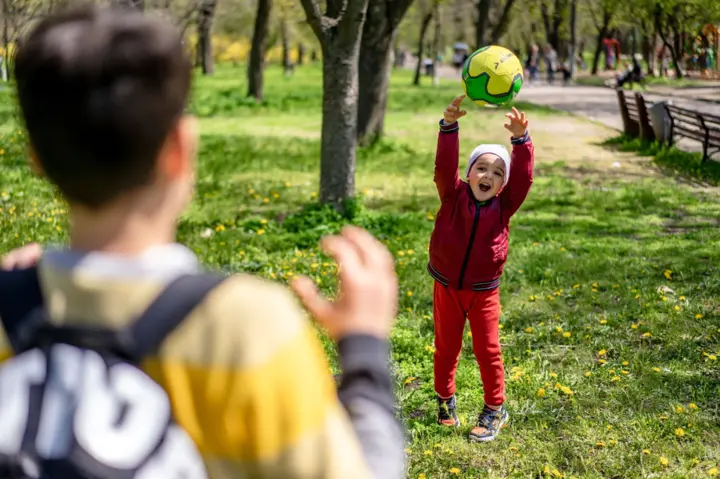6 things to consider when raising children outside your home country
Living outside your home country is accompanied by mixed feelings and countless challenges. However, it may turn out to be a great experience. With your luggage packed, you set off for a new place to live for one reason or another. When you receive exciting and life-changing news that you will become a father, it can sometimes remind you of your childhood experiences. This news may make you miss the home country where you grew up. One way to close the gap is to have a loved one (such as a mother) be there to help you breastfeed the baby. And finally, raising a child. But if that's not possible, you can still beat it. All you have to do is pay attention to Chesley Sollenberger's words in Flight 1549, "Prepare for Shock.
Recommend
1. Prepare yourself

First, prepare yourself mentally. Believe in yourself. Challenge yourself that you will succeed in breastfeeding and raising your baby. Be inspired by other parents who have done the same thing or are still doing so.
Second, prepare yourself for impending changes by tidying things up front. For example, prepare your home and make it child-friendly, provide for your basic needs such as food and maybe keep some pre-cooked/easy-to-prepare foods, etc. Stay tuned for our future article on "How to prepare for your baby's arrival."
Thirdly, don't forget to check the relevant policies and laws for children in your "new" country of residence.
2. Connect with people who can support you

Raising a child can be a very difficult task. If you're a single mother, this makes it even more difficult. Again, if your husband works, you'll be alone most of the time with the kids, and that's also a big challenge. Also, if you come from a culture where friends and family support parents in raising children, this type of support may be very limited in your new country. Social/moral support brings happiness, emotional balance, and strength that can help parents raise their children. I suggest you find a way to connect with your family and friends. You can get some support via video and voice calls. I must say that this cannot replace their physical existence. Try to connect with the relevant communities where you live. For example, where I live, most kindergartens have clubs for new mothers that meet once a week. Here, she meets other mothers, and the children play together. Check what's true on your site.
3. Appreciate existing cultural differences

We were all raised in one culture or another. This can greatly affect our views. Raising your children between two cultures will give them the opportunity to have a more balanced point of view. Cultural differences can also be difficult for parents as some aspects of their culture can be lost if children adopt the culture of the society in which they were born. Parents should know that they make up the vast majority of their children's exposure to their culture. The beautiful memories and rituals that parents lived during their upbringing should not be discarded but preserved. Draw ideas from those experiments and reject barbaric experiences (if any). However, children may not fully share the cultural background and beliefs of their parents – don't worry. Show appreciation for the good culture of any country you currently live in. Don't worry when your kids are more aligned with the culture of the place where they grew up. Do not forget that it is your responsibility as a parent to guide them, monitor them and provide them with balanced perspectives.
4. Recognition of language differences

Parents should understand that living in a new country may also bring communication difficulties, especially when the mother tongue is different. In general, the way parents respond to language challenges can affect their children as well. You must understand that raising children in a country that speaks a language other than your native language requires you to integrate through language learning. This is not specific to language differences alone; there can be differences in nuances, expressions, and proverbs. But it can be fun if you look at it in a positive light. Learning a new language improves your brain function. You should encourage your children to learn and speak the local language/dialect. With this, they will undoubtedly fit into your new community more easily than otherwise. As a parent, start learning the foreign language of your new country of residence as soon as possible. Don't worry too much about children. They will learn the language faster than you think. Make friends and let them teach you their language and culture. Ultimately, it will be a general advantage for you and your family.
5. Learn how to manage the stress and guilt associated with parents

It is possible for parents to feel stressed when raising their children outside their home country for many reasons. You may feel guilty when you think that your close family members may not know your children. Or who can children turn to as a family? Will they feel lonely because of it? With all these questions, one may feel stressed by raising children in a foreign country with the rest of the extended family absent. Learn how to manage these fears and anxieties by doing your best to connect with your family members. Just know that everything will end well. You don't feel guilty and don't get stressed.
6. Think about the opportunities your children may have

Take a look around and calculate the positive things your children might experience in your new country of residence. Focus on raising your children to become the best they can be. Give them a good education and fun activities that make life more enjoyable for them. You need to prepare them for better opportunities that await them. Are there other things one can consider while raising your children outside their country of origin?








